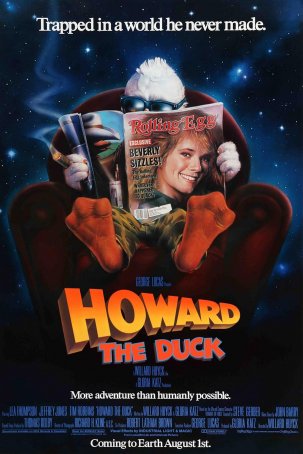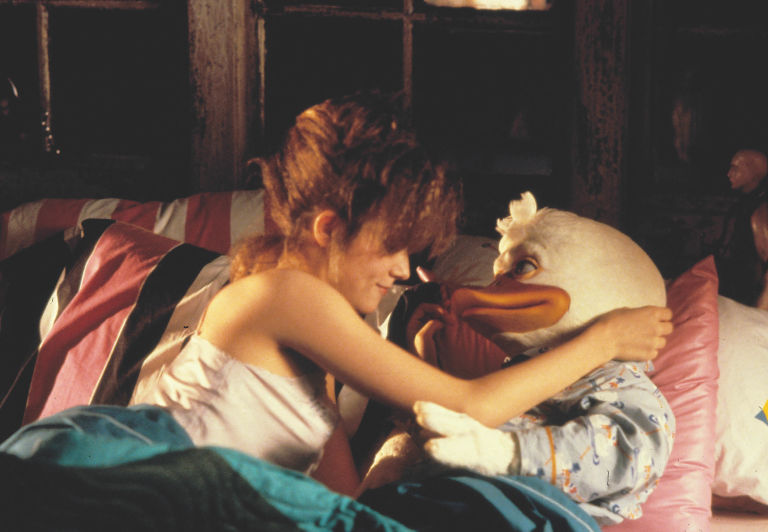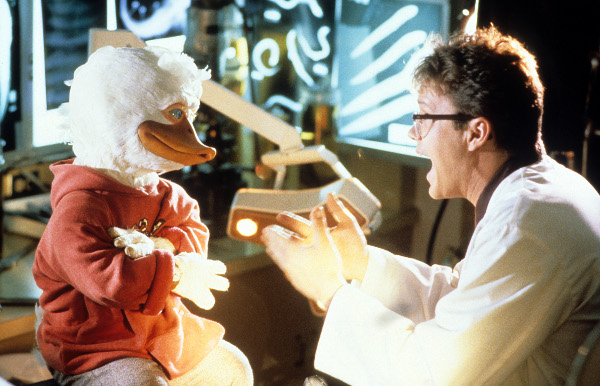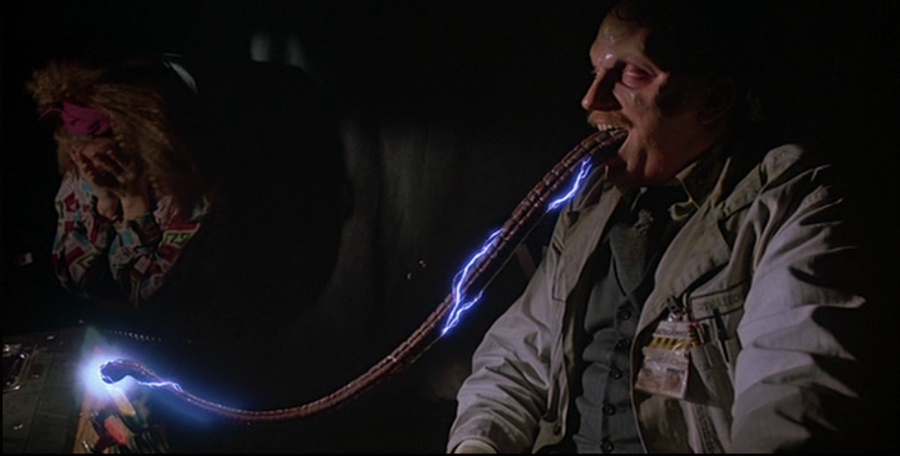Howard the Duck (United States, 1986)
May 03, 2024
What were they thinking?
To anyone who was a fan of the original 1970s run of the comic book (written by Steve Gerber and drawn primarily by Gene Colan), it seemed unlikely that a live-action film could recapture the absurd zaniness that the creators brought to the page. George Lucas, an avowed fan of the “Howard the Duck” series, should have known better. But perhaps the hubris associated with the success of Star Wars led him to believe he could do almost anything. The abject failure of Howard the Duck may have been a sobering reality check. (To regain financial solvency after losing so much money on this project, he apparently sold Steve Jobs the animated portion of ILM, which Jobs subsequently turned into Pixar.)
The movie was awaited with some degree of anticipation by the Marvel faithful. Although the comic book company had been successful with several TV projects, there had yet to be a true motion picture adaptation of a Marvel character. (The only previous films with any Marvel DNA were 1984’s Conan the Destroyer, which was co-written by Marvel stalwarts Roy Thomas & Gerry Conway, and 1985’s Red Sonja, which was based more on the comic book than the Robert E. Howard source material.) Consequently, Howard the Duck was viewed as a breakthrough and, with George Lucas bankrolling the project, expectations were high. Those were quickly dashed on opening day.
Howard the Duck is a bad movie. It doesn’t work as a comic book adaptation, a comedy, an action/adventure film, a fantasy/science fiction pastiche, or a combination of any of the above. The humor is juvenile. The action is cheesy and unexciting. The costume is embarrassing. The script feels like it was cobbled together by people with no knowledge of comic books but who were pretending expertise. (The writers were longtime Lucas collaborators Willard Huyck – who also directed – and Gloria Katz. They previously teamed up on screenplays for American Graffiti and Indiana Jones and the Temple of Doom.)
 The movie opens with a bit of terrible world building. Duckworld,
Howard’s home planet, is as poorly developed as might be possible. It’s an
Earth-like demesne inhabited not by humans but walking, talking ducks. (Donald
and Daffy would be at home if their respective studio-owners at the time had allowed
them to make cameos.) Howard (played by Ed Gale in a suit and voiced by Chip
Zien) is just another ordinary anthropomorphic duck until he is propelled by a
mysterious force across space to Earth. He lands in (of all places) Cleveland,
where he meets rocker Beverly Switzler (Lea Thompson), who takes pity on the
confused man-duck and allows him to spend the night in her apartment.
The movie opens with a bit of terrible world building. Duckworld,
Howard’s home planet, is as poorly developed as might be possible. It’s an
Earth-like demesne inhabited not by humans but walking, talking ducks. (Donald
and Daffy would be at home if their respective studio-owners at the time had allowed
them to make cameos.) Howard (played by Ed Gale in a suit and voiced by Chip
Zien) is just another ordinary anthropomorphic duck until he is propelled by a
mysterious force across space to Earth. He lands in (of all places) Cleveland,
where he meets rocker Beverly Switzler (Lea Thompson), who takes pity on the
confused man-duck and allows him to spend the night in her apartment.
Howard’s lone goal is to get back to Duckworld and, with Beverly’s help, he starts the quest by meeting Phil Blumburtt (Tim Robbins), a lab assistant who isn’t immediately able to help. Later, however, Phil arrives at a plausible theory about how Howard made his space trip. He introduces the duck to Dr. Walter Jenning (Jeffrey Jones), who may be able to reverse the process. Their attempts to act on this result in an equipment malfunction that brings the so-called Dark Overlord of the Universe to Earth, where he inhabits Walter’s body.
One of the most controversial aspects of Howard the Duck relates to Howard’s relationship with Beverly. The two openly flirt and there’s one scene in which things come close to becoming sexual. Although this is in keeping with the comic book, where the two were in a “relationship,” it came as an unwelcome surprise to parents expecting a family-friendly experience (the MPAA accorded the movie a PG-rating). The primary issue is that the romantic elements are handled so poorly (there’s no evidence of any chemistry between Howard and Beverly) that the scene becomes creepy and off-putting rather than cute or subversive. Like many other aspects of Howard the Duck, it might have worked with pen-and-ink drawings but it comes across as imbecilic and incompetent in a live-action motion picture.
 Therein lies the movie’s central flaw. Lucas’ original
vision was to make Howard the Duck animated. The decision to move to a
live-action approach was necessitated by Universal’s desire to get the movie into
theaters as quickly as possible. And, as far as special effects had come during
the previous decade (due in large part to Lucas), they hadn’t come far enough.
Pretty much everything in Howard the Duck looks cheap and unconvincing,
including the title character. And Chip Zien’s vocal “stylings” are flat and
lacking in the necessary bite. He was hired because of his ability to synchronize
his words with Howard’s beak movements, since the dialogue was recorded after
the completion of filming. Robin Williams, who was the original choice, quit
after a week because he felt unreasonably constrained. As for the live actors,
Lea Thompson is as appealing as in anything she did during the 1980s, Jeffrey Jones
is over-the-top (as was his wont), and Tim Robbins is godawful. (If not for Top Gun coming out the same year, he might never have had a career. His
signature role in Bull Durham was still two years off.)
Therein lies the movie’s central flaw. Lucas’ original
vision was to make Howard the Duck animated. The decision to move to a
live-action approach was necessitated by Universal’s desire to get the movie into
theaters as quickly as possible. And, as far as special effects had come during
the previous decade (due in large part to Lucas), they hadn’t come far enough.
Pretty much everything in Howard the Duck looks cheap and unconvincing,
including the title character. And Chip Zien’s vocal “stylings” are flat and
lacking in the necessary bite. He was hired because of his ability to synchronize
his words with Howard’s beak movements, since the dialogue was recorded after
the completion of filming. Robin Williams, who was the original choice, quit
after a week because he felt unreasonably constrained. As for the live actors,
Lea Thompson is as appealing as in anything she did during the 1980s, Jeffrey Jones
is over-the-top (as was his wont), and Tim Robbins is godawful. (If not for Top Gun coming out the same year, he might never have had a career. His
signature role in Bull Durham was still two years off.)
 Despite numerous disputes with Marvel over the years, Steve Geber
gave a lukewarm nod of approval toward the film version. Gene Colan, on the
other hand, wasn’t so kind. Although he never saw the finished production
(having been warned away from it), he knew enough from friends and family to offer
an appraisal of sorts: “They made a film and it was a disaster. When [Hollywood]
got their hands on it, they did something to destroy it…They had a good book.
And what they succeeded in doing was wrecking it.”
Despite numerous disputes with Marvel over the years, Steve Geber
gave a lukewarm nod of approval toward the film version. Gene Colan, on the
other hand, wasn’t so kind. Although he never saw the finished production
(having been warned away from it), he knew enough from friends and family to offer
an appraisal of sorts: “They made a film and it was a disaster. When [Hollywood]
got their hands on it, they did something to destroy it…They had a good book.
And what they succeeded in doing was wrecking it.”
Over the years, although Howard the Duck has achieved a dubious cult status (something seemingly true of many really awful movies), time has improved its quality only in the memories of viewers. Looking back through the haze of nearly 40 years, perhaps Howard the Duck doesn’t seem as bad as it did when it unspooled in theaters during August 1986. Taking a fresh look, however, dredges up the ugliness. This was a bad movie when it was released. It is a bad movie today. And it will continue to be a bad movie long after this planet ceases to exist. In the future, it’s possible that the character of Howard the Duck can be redeemed. No such accommodation could ever be made for Willard Huyck’s embarrassment of an adaptation.
Howard the Duck (United States, 1986)
Cast: Lea Thompson, Jeffrey Jones, Tim Robbins, Ed Gale, Chip Zien
Home Release Date: 2024-05-03
Screenplay: Willard Huyck & Gloria Katz, based on characters created by Steve Gerber
Cinematography: Richard H. Kline
Music: John Barry
U.S. Distributor: Universal Pictures
U.S. Home Release Date: 2024-05-03
MPAA Rating: "PG" (Violence, Sexual Content, Profanity)
Genre: Science Fiction/Adventure
Subtitles: none
Theatrical Aspect Ratio: 1.85:1
- Back to the Future (1985)
- Sierra Burgess Is a Loser (2018)
- (There are no more better movies of Lea Thompson)
- Left Behind (2014)
- (There are no more worst movies of Lea Thompson)
Comments